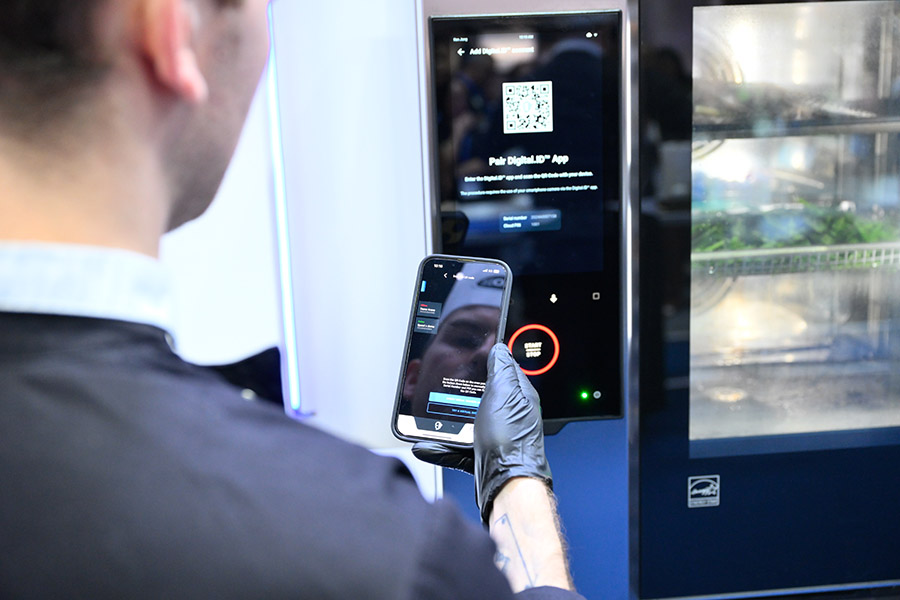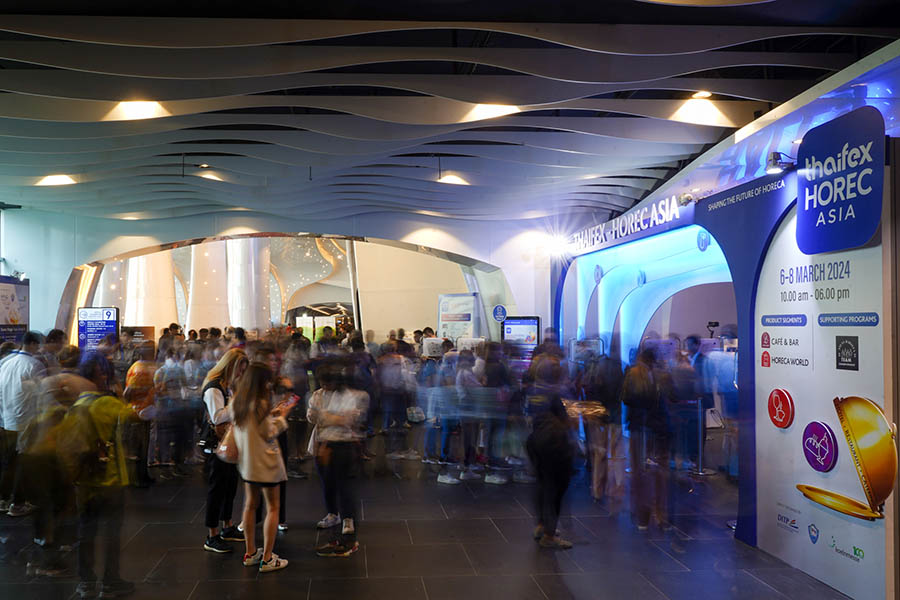Southeast Asia’s hospitality industry, like many others, is undergoing a remarkable transformation, powered by the integration of advanced technology into its core operations – a trend which was accelerated during the COVID-19 pandemic.
While attending THAIFEX - HOREC Asia 2024 in Bangkok, B2B Cambodia had the chance to speak with Matthew Clark, Regional Director of Sales at Shiji Group, and Puneet Mahindroo, Founder and CEO of Rev-Mantra, about the trajectory of technological evolution and its impact on hospitality operations.
Clark and Mahindroo attended THAIFEX - HOREC Asia 2024 as speakers for the THAIFEX - HOREC Academy Main Stage where 69 industry experts gave presentations and engaged in panel discussions highlighting the hotels, restaurants and catering (HORECA) sector’s trends and best practices.
Representing Shiji Group, a multinational technology company that provides software solutions and services for enterprises in the hospitality industry, and Rev-Mantra, a hospitality consulting firm that specialises in tech integration, respectively, both Clark and Mahindroo were there to discuss how technology can be used to elevate guest and customer experiences, as well as to optimise operations and revenue.
How Is Technology Being Used To Enhance Operational Efficiency Of Hotels And Restaurants?
Addressing A Skills Shortage And Gap
Clark highlighted the critical role technology plays in addressing the industry's challenges, particularly the shortage of skilled labour and the demand for localised service delivery. "In this region, and also globally, we've seen [human] resources leave the industry in many cases over the last few years, and struggle to come back to the industry," said Clark. "We've also seen a lack of knowledge and skill sets in the industry, so technology is addressing that skills shortage and skills gap."
"The second part of technology is the local adaptation, the localisation of service delivery, and personalisation. That can be something as simple as the handling of multilingual requirements, the handling of currency and payment in various forms, and also meeting the local demands of how an industry wants to react with its customer," he added.
Data-Driven Decision Making In Restaurants
Mahindroo underscored the potential of data and technology in revolutionising restaurant operations and revenue optimisation, emphasising the importance of understanding the customer lifecycle and leveraging technology at each touchpoint to enhance efficiency.
“For example, during COVID, we saw a lot of contactless technology being introduced, a lot of digital menus coming to par, online booking systems, and so on, but everyone thought about it in a piecemeal manner, no one looked at it as an overall strategy," said Mahindroo. "So it's important that the focus is not only on bringing cost efficiency, but also towards revenue efficiencies, because there's only a very little margin in a high-fixed cost business to cut costs.” He further identified four key areas for revenue optimisation that can be enhanced using data and analytics:
- Menu engineering
- Server training powered by analytics
- Strategic table allocation during peak periods
- Optimised procurement processes.
No one has really looked at data and analytics and followed the role of what a tennis coach would do with individual attention on each server's strengths and weaknesses, so [a technological data system could be used] to predict that behaviour and provide guidance," said Mahindroo about using analytics to train restaurant servers.
Commenting on optimising procurement processes to cut down overall costs, he said: "If you're able to predict what your seat table occupancy is going to be, what type of menu items you're going to serve, then you can power this information into your procurement system and manage your power levels much more efficiently, which is about 10 to 15 per cent of the cost of a restaurant. Optimising on that, we've generally seen gains in terms of incremental revenue in the range of seven to eight per cent. We've seen profitability gains even higher in terms of 10 to 12 per cent, just by deploying advanced technology and algorithms.”
Broad Technological Trends In Hospitality: Contactless Services, Localisation And Sustainability
Both Clark and Mahindroo agreed that the pandemic accelerated existing technological trends rather than introducing new ones. The adoption of cashless transactions, digital menus, and contactless services have become essential.
People keep talking about these trends as ‘post-COVID’ but they're not ‘post-COVID’, these trends were already happening pre-COVID, they were just amplified or accelerated," said Clark.

"The local adaptation of systems that can handle contactless, cashless payments is imperative. The ability for me to scan a QR code, for example, and look at a menu or spa offering in my preferred language is very important, as is an operator being able to graphically display their service delivery, not just in text, but in the form of images and videos. All of this enables operators to more locally connect with their guests," he added.
Moreover, innovations aimed at reducing food wastage and enhancing procurement efficiency are noteworthy trends that reflect a growing concern for sustainability and operational excellence.
“There is some great innovation taking place in terms of food wastage, and how to minimise food wastage, [including] just-in-time management, which is an old Japanese concept of inventory management and planning, which I see more and more along with more efficient procurement systems," shared Mahindroo.
How Is Technology Impacting Employment In Southeast Asia's Hospitality Industry?
Contrary to concerns about new technology displacing jobs in the hospitality industry, Clark argued that technology enhances job roles, enabling staff to deliver more personalised services. He added that the skills acquired through engagement with modern technologies are highly transferable, offering employees flexibility and growth opportunities within the industry.
What I would say is that technology is certainly not displacing employment opportunities –it's enhancing, filling a gap, and supporting staff to do a more personal and more concierge-style of service, if you like, rather than a transaction.
"Importantly, though, for somebody who's entering the industry for the first time in Cambodia, or wherever else they may be: the skills that they learn are going to be immediately transferable. So if they choose to stay home and work within their home region, that's okay, but if they'd like to take those skills and move them to another location, the potential is absolutely there," added Clark.
How Can Hospitality Businesses In Southeast Asia Overcome The Digital Divide To Keep Up With Technology Trends?
Despite the digital divide in Southeast Asia, both experts shared that they believe quality technological solutions, which are adaptable and require minimal infrastructure, can overcome these challenges.
“I think the trend towards cloud mobile digital technology obviously put significant demand on some infrastructure, however, if the technology is at quality, for example, that technology can actually be surprisingly light on the demands of the infrastructure that might be immediately available in that location or in that region," offered Clark. "But then the ability for that solution, that technology, to be freely open to connect is vital. [Shiji Group] understand the need for us to be able to localise our solution, as we move into a new country. We are well aware of the need to be fiscally compliant and fiscally responsible as we move into a new country in a new region, and our technology is purposely open to make that adaptable each time.”
The shift towards integrated solutions and the collaboration between different industry players signify a progressive approach to technology adoption, emphasising the importance of creating an inclusive digital ecosystem.
“I think there is a huge change in paradigm. The [hospitality] industry, for a long time, worked as a point-and-connect kind of industry, a hub and spoke kind of a model, but now we are moving more and more towards integrated solutions across platforms," said Mahindroo. "I think different players in the industry have recognised that on their own, they are only part-solving the problem, they are not building an ecosystem. So we find a lot more collaboration, a lot more synergy between different companies coming together and announcing partnerships."
Strategies For Training And Education In New Technologies
Clark and Mahindroo stressed the importance of ongoing education and training in new technologies, both also sharing that Shiji Group and Rev-Mantra are each investing in training programs and partnerships.

“I think the first burden lies on us, so whenever we build or deploy something new, our first recognition has been to understand that this [technology] is very nascent and new for most people, so instead of putting the burden on them self-educating, we have built an ecosystem of training programs in collaboration with some partners and some on our own," shared Mahindroo.
For long, technology companies have thought that they can do one point-and-click kind of training on how [a technology] works and then be done with it, but I think, as a company ourselves and like our partners that we work with, there is a huge realisation that in order to make any technology work, you need to educate and that process needs to be ongoing, it can't be a one-time effort.
"The second thing is to be able to show the benefit, so education is not limited to just imparting knowledge but showing how that knowledge is actionable and how it generates a benefit for the business. I think it needs to be addressed more holistically rather than very tactically, so education around technology products should be an inherent strategy, rather than a one-off," he added.
Clark, however, also noted that in addition to needed education and training, new technology must also strive to be user friendly and responsive so anyone can quickly adapt to its use.
“The quality of the technology needs to be advancing the industry, that's for sure, but it also needs to be technology that is relatable," he said. "I think the common analogy is that nobody gives you an instruction book with your new phone, right? You just learn how to use it. So technology, to some degree, should be like that.
Future Trends In Hospitality Technology
In the years to come, Clark and Mahindroo predict a continued focus on personalisation, sustainability, and performance optimisation.
It's all around this personalisation of service back to the guests – everybody talks about it, but we're not quite there yet," said Clark.
"We see that we are certainly on the right way to addressing personalisation, and by that I mean there are so many different groups of travellers today, so many different types of customers today, and they all have different preferences, likes and dislikes, ways they want to be engaged. For a restaurant operator to be able to predict that, for a hotel operator to be able to support that, a lot of systems actually need to come together. There's not going to be one fix for this ‘problem’, if you like, so we are definitely on the right path where technology is becoming better integrated and the core view of the guest is becoming clearer, but we're just not quite there yet," he added.
Overall, the industry is expected to adopt more environmentally friendly practices, utilise data analytics and artificial intelligence for operational efficiency, and attract a younger workforce by making hospitality careers more appealing.
"I find that a lot of hospitality schools are at 50 per cent occupation right now, a lot of students are not gravitating towards hospitality," shared Mahindroo. "I think that's where we need to change our mindset of how we've been running this business, and really recognise how Millennials, Generation Z and the generations to follow view workplace practices, how they see growing in a particular career a little more extensively."
So ensuring that people continue to be interested in the hospitality business is critical, because even as we live in a time where new technological solutions seem to be springing up at a rate never seen before, at the end of the day: "It's a people business," stressed Mahindroo. Robots can't fill in for everyone.